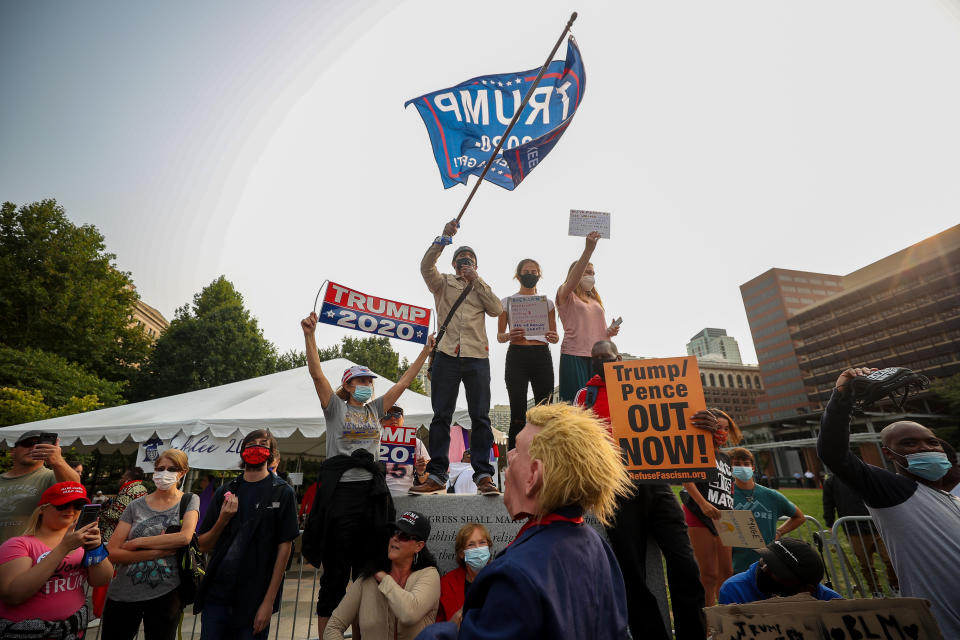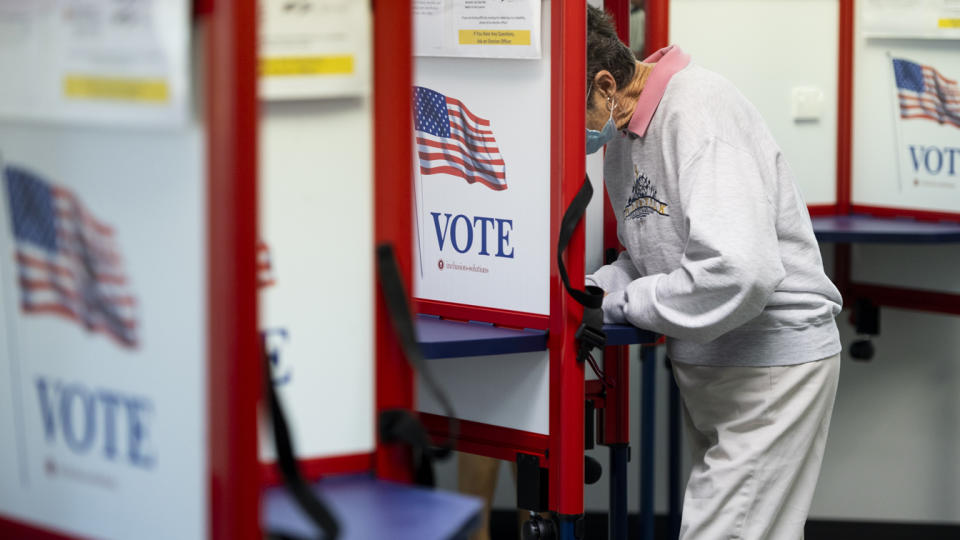New Yahoo News/YouGov poll: Only 22% of Americans think the 2020 presidential election will be 'free and fair'
Just 22 percent of Americans believe this year’s presidential election will be “free and fair,” according to a new Yahoo News/YouGov poll — a disturbing loss of confidence in the democratic process that could foreshadow a catastrophic post-election period with millions of partisans refusing to accept the legitimacy of the results.
The survey, which was conducted from Sept. 15 to 17, found that both Republicans and Democrats harbor grave and growing doubts about whether the upcoming election will accurately reflect the will of the people.
Half of Trump supporters (50 percent) say the election will not be free and fair; more than a third of Biden supporters (37 percent) agree. Overall, the number of Americans who say the election will not be free and fair (46 percent) is more than twice the number who say the opposite. Another third (32 percent) say they’re not sure what to expect.

Although fears on the right and the left are different, the outcome could be the same, particularly if the contest is close: a winner viewed as fundamentally illegitimate by those who didn’t vote for him, and a democracy that suffers deep and lasting damage because of it.
The public is primed to distrust whatever happens on Nov. 3. More than a third of Americans (34 percent) think the coming election will be rigged in favor of one candidate or another, while just 24 percent reject this notion. A full 60 percent, meanwhile, believe at least some fraud will occur — and 34 percent think it will be enough to swing the outcome.
These views fly in the face of overwhelming evidence that U.S. elections are not subject to widespread fraud and assurances from experts — even Vice President Mike Pence’s own election law adviser — that the election cannot be rigged.
“You’re not going to see widespread fraud in a presidential or a Senate or a governor’s race,” Michael Adams, who is Pence’s top election law adviser and Kentucky’s top elections official, recently told Yahoo News. “It’s just not feasible. And it hasn’t been [feasible] in 70 or 80 years.”
The problem is that just 19 percent of Americans believe election experts like Adams who say a U.S. presidential election cannot be rigged. A majority — 57 percent — do not.
The latest Yahoo News/YouGov survey shows Joe Biden leading President Trump 47 percent to 41 percent — a smaller margin than the previous week’s poll, but one consistent with national polling averages that have given Biden a stable 6- to 8-point lead. Trailing for months, Trump has worked to undermine trust in an election he fears he might lose, going so far as to stigmatize and perhaps even hinder mail-in voting; to predict widespread cheating on behalf of his opponent; and to refuse to commit to accepting the results.
“The only way we’re going to lose this election,” Trump recently said in Wisconsin, “is if the election is rigged.”

Trump’s supporters have largely bought into his false and dangerous claim that the U.S. political system cannot deliver a legitimate outcome in which their candidate loses. Nearly half of Trump supporters (48 percent) say the election will be rigged. Twice as many (45 percent) say there will be enough fraud to swing the outcome as say there won’t (22 percent). And a staggering 61 percent say “the only way Donald Trump is going to lose is November is if the election is rigged,” parroting the president.
As a result, Trump supporters are the only group of Americans who are torn over which is more important: “determining the outcome of the election quickly, even if many mail-in ballots have not been counted” (48 percent) or “waiting for mail-in ballots to be counted so we are sure which candidate won, even if the process drags on for some time” (52 percent).
In contrast, nearly all Biden supporters favor counting every vote (91 percent) over determining the outcome quickly (9 percent) — a position that three-quarters of Americans agree with.
This difference reflects a deeper divide between the right and left over what represents the greatest threat to the integrity of the election: “people voting who shouldn’t be allowed to vote” versus “people who should be allowed to vote not being allowed to vote.” Nearly three-quarters of Trump supporters (72 percent) say the former will be a bigger problem on Election Day; 82 percent of Biden supporters say the latter.

In reality, extensive research has shown that election fraud (such as intentional double voting) is a minor phenomenon that does not occur at levels sufficient to sway a presidential contest. Voter suppression — the left’s concern — exerts a much greater influence over election results.
The upshot is that many Biden supporters now fear voter suppression or foreign interference could help Trump win. Nearly half (44 percent) don’t believe experts who say a U.S. presidential election cannot be rigged, and roughly the same number (27 percent) think the election will be rigged in favor of one candidate or another, presumably Trump. A full 89 percent of Biden supporters are either very or somewhat worried that people will be prevented from voting, while 76 percent are very or somewhat worried that foreign countries will interfere. The same number (76 percent) worry that legitimate mail ballots will not be counted.
And so if November’s election is anything short of a landslide, it’s not hard to imagine a disaster scenario in which large numbers of Americans come to question the legitimacy of the next president — no matter who wins.
Right now, majorities of the public are either very or somewhat worried about fraudulent postal voting (56 percent), foreign interference (53 percent), not counting legitimate mail ballots (68 percent), people being prevented from voting (56 percent) and one of the candidates refusing to accept the outcome (64 percent). Less than half of Americans (46 percent) trust their state to accurately count all the votes. Most either don’t trust their state (26 percent) or aren’t sure (28 percent).
That’s a lot of doubt to overcome in a deeply polarized environment where faith in institutions has fallen to an all-time low.

Either way, the matter is unlikely to be settled on Election Day itself. Asked when this year’s losing candidate should concede, just 22 percent say “when the networks call the race, regardless of whether all mail-in votes have been counted” — the customary practice. (Network analysts account for outstanding votes and only the call the race after the winner has amassed an insurmountable lead.) Instead, more than two-thirds of Americans say the process should continue past Nov. 3, either until “all mail-in votes have been counted, even if that process takes weeks” (53 percent) or until “any election challenges have been fully litigated in court, even if that process takes months” (14 percent).
Another 10 percent of Americans say the losing candidate should “never” concede “because the result of the election cannot be trusted.”
_____________________
The Yahoo News survey was conducted by YouGov using a nationally representative sample of 1,539 U.S. adult residents interviewed online from September 15 to 17. This sample was weighted according to gender, age, race and education based on the American Community Survey, conducted by the U.S. Bureau of the Census, as well as 2016 presidential vote, registration status, geographic region and news interest. Respondents were selected from YouGov’s opt-in panel to be representative of all U.S residents. The margin of error is approximately 3.5 percent.
_____
Read more from Yahoo News:

 Yahoo News
Yahoo News 


